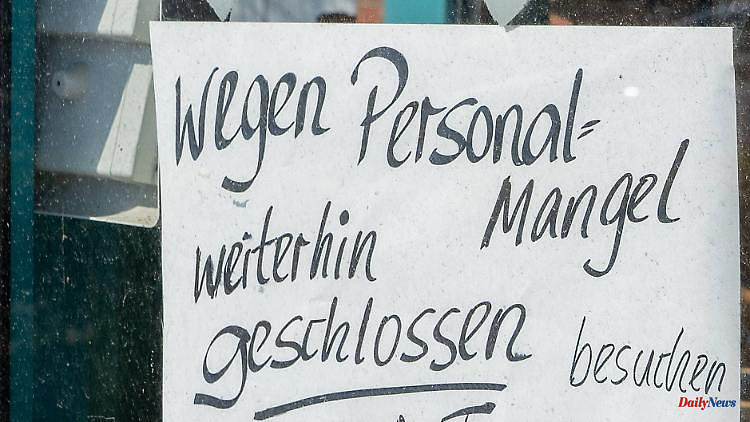We're sitting on a time bomb, but because of the war, the pandemic and Hollywood beds full of shit, we don't get it: We don't find enough people to do the work. And in all areas.
Imagine you are boarding an airplane. The pilot, in his early 40s, greets you beaming at the door. "Well, you're happy," you say and he laughs, says: "Well, I'm lucky, I can fly!" You look blank. He pulls you towards him and says quietly: "Actually, you have to get a B in training, but because you can hardly find any pilots, a C is enough now!" He winks conspiratorially, nudges you encouragingly in the side and wishes you a good flight.
Stupid, isn't it? Flying with mediocrity, hopefully that goes well. I'm not very familiar with pilotology, but I am with judges - and that's exactly what happens there. North Rhine-Westphalia has also just lowered the standards, so lawyers there can now switch to judges at 41 and a mediocre exam. The "predicate", so to speak the one among lawyers, the formerly only valid entry ticket to the judicial service, is passé.
These are not isolated cases. Speaking of lawyers: the "glut of lawyers" is over, the number of which is now actually declining slightly, and in rural areas they are often completely absent. Journalism used to be an overrun dream job, now editors-in-chief are biting their nails because they can't find any new recruits. The baby boomer generation is retiring - and not enough is coming.
In the circle of relatives and acquaintances, the anecdotes of delayed operations and examinations are piling up, because the staffing level - also due to Corona, of course - is so thin that any disruption immediately leads to delays lasting months.
There really is a lack of people everywhere. If you think of craftsmen and nursing staff when you hear the word shortage of skilled workers, you haven't paid attention. Ultimately, "everything is missing everywhere," as a member of the Bundestag recently put it to me. She herself is looking in vain for people for her office. In Berlin alone there will be a shortage of 1,000 teachers in the coming year. one thousand!
We have too few doctors, too few nurses, too few lawyers, too few hairdressers, too few truck drivers, too few judges, too few journalists, too few craftsmen, too few educators - there is almost no industry that doesn't lack skilled workers .
The Institute of German Economics in Cologne estimates that there will be a shortage of around 307,000 nursing staff by 2035. The Marburger Bund warns that 22 percent of the approximately 400,000 doctors have only been working for a few more years or are about to retire. In Hesse, the Judges' Association warns that the accused must be released because 200 lawyers are missing. "The shortage of skilled workers reaches a record level" is a headline that we have not read for the last time.
The fact that Germany is not currently conducting a heated debate, playing talk shows and making fiery speeches is actually completely absurd – and then it can be explained again: After all, we have other things on our hands and a shrinking attention span between Tiktok, shit in bed by Johnny Depp and the gasoline prices. The glaring themes of the present cast long shadows under the protection of which great catastrophes are brewing - like a serious illness that has been looming for years.
The extent to which war and the pandemic have thrown public mechanisms out of sync has been evident for weeks. The five largest newspapers open with five different topics on many days, and there is no discernible direction. However, we do not pay enough attention to many topics at the same time. So let's stick with war, pandemic and maybe tank discount. Some may still be interested in climate change, the EU ban on combustion engines and of course inflation. And, of course, always nonsense topics such as alleged gender madness or cancel culture.
What is actually, quite fundamentally, to do with the topic of economic policy? Despite inflation of an incredible 8.1 percent and a 100 billion package for the Bundeswehr, the Federal Minister of Economics is promoting tax increases of up to 57 percent. Is that supposed to attract skilled workers? The well-loved Robert Habeck could just mess up the traffic lights if he sticks to this anti-business course. The outcry just doesn't seem loud enough to me.
Germany's economy is in the middle of an accelerated energy transition, a grotesquely late digital transformation and an extremely tense world situation with chronically unreliable supply chains - but the general public does not care that companies are pushing orders and infrastructure projects are being left undone because no people can be found.
The following applies to the shortage of skilled workers: We do not fill the shortage from our own resources. Generation Z is driving HR professionals crazy: they no longer want to work themselves to death, some have found that postponing enjoyment of life until retirement age does not always pay off. Part-time is not Aperol time, this generation defiantly clarifies. Self-realization, doing good, leisure - but who cuts hair now, takes out the appendix, takes care of grandpa's decubitus, programs the administration databases and judges in neighborhood disputes?
The foreigners maybe. The traffic light is just beginning to implement its ambitious plans in migration policy. So far, however, "Germany is an immigration country" has been just as platituded and hollow as our declarations of support for Ukraine. Apropos: Their refugees are currently being bureaucratically distributed across the country and end up in structurally weak areas - instead of where work beckons.
The other would be a training initiative: making lifelong learning a reality. The coalition agreement provides that there should be "training ambassadors" and they want to make master craftsman training easier. In Hesse, black-green has just shot down an initiative for free master craftsman training - it remained a regional political issue.
Federal policy is currently focused on combating economic, erratic symptoms. The idiotic "tank discount" didn't prevent record fuel prices, punks on Sylt are happy about the 9-euro ticket and the new top tax rate would certainly ensure left-wing, comfortable redistribution. This is not a future-proof economic policy.
The shortage of skilled workers and workers is a huge political problem that unfortunately shares the fate of pandemic prevention: action would have to be taken now, even if the public is not yet awake, in the shadow of other disasters - before it's too late.












